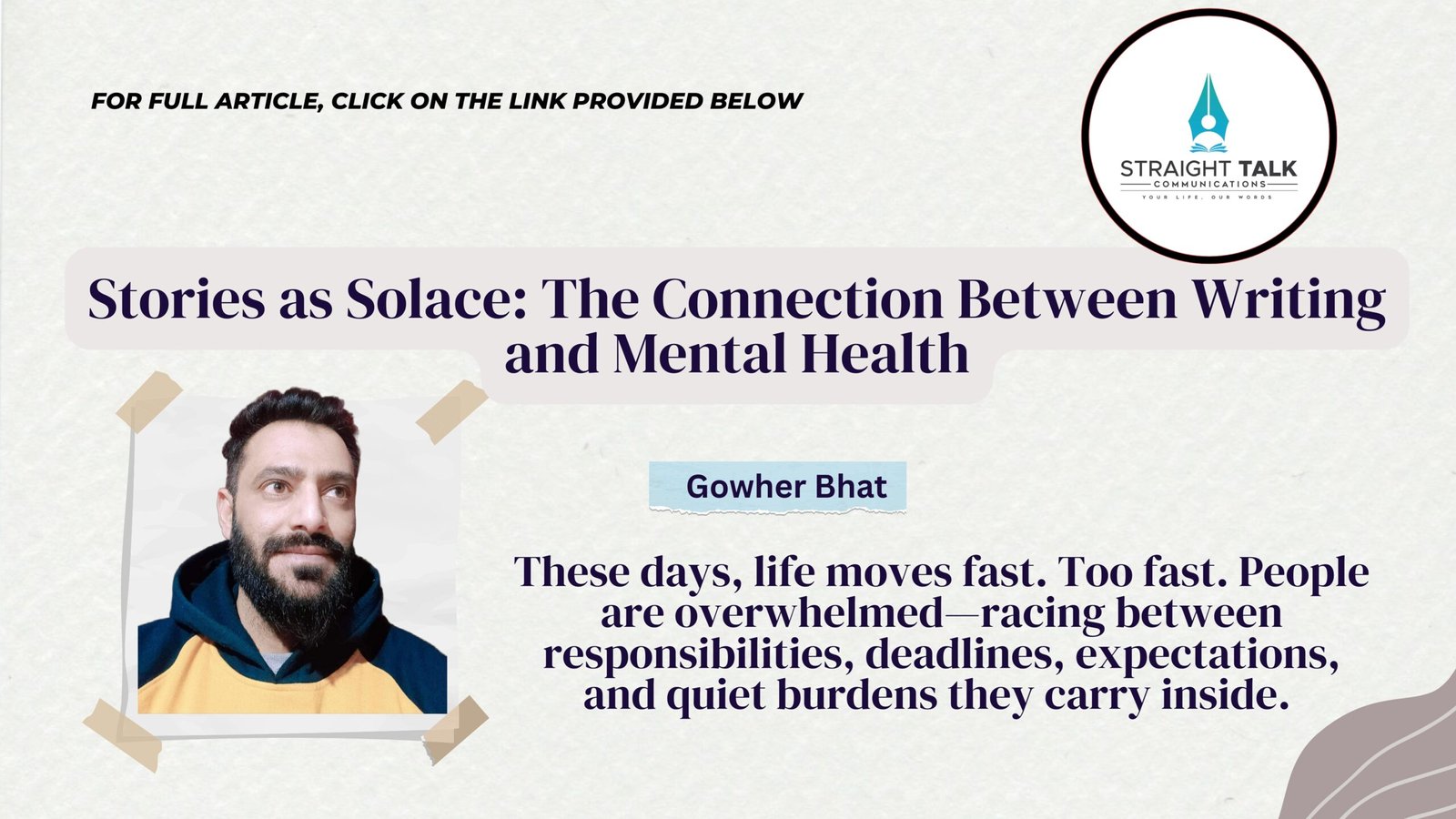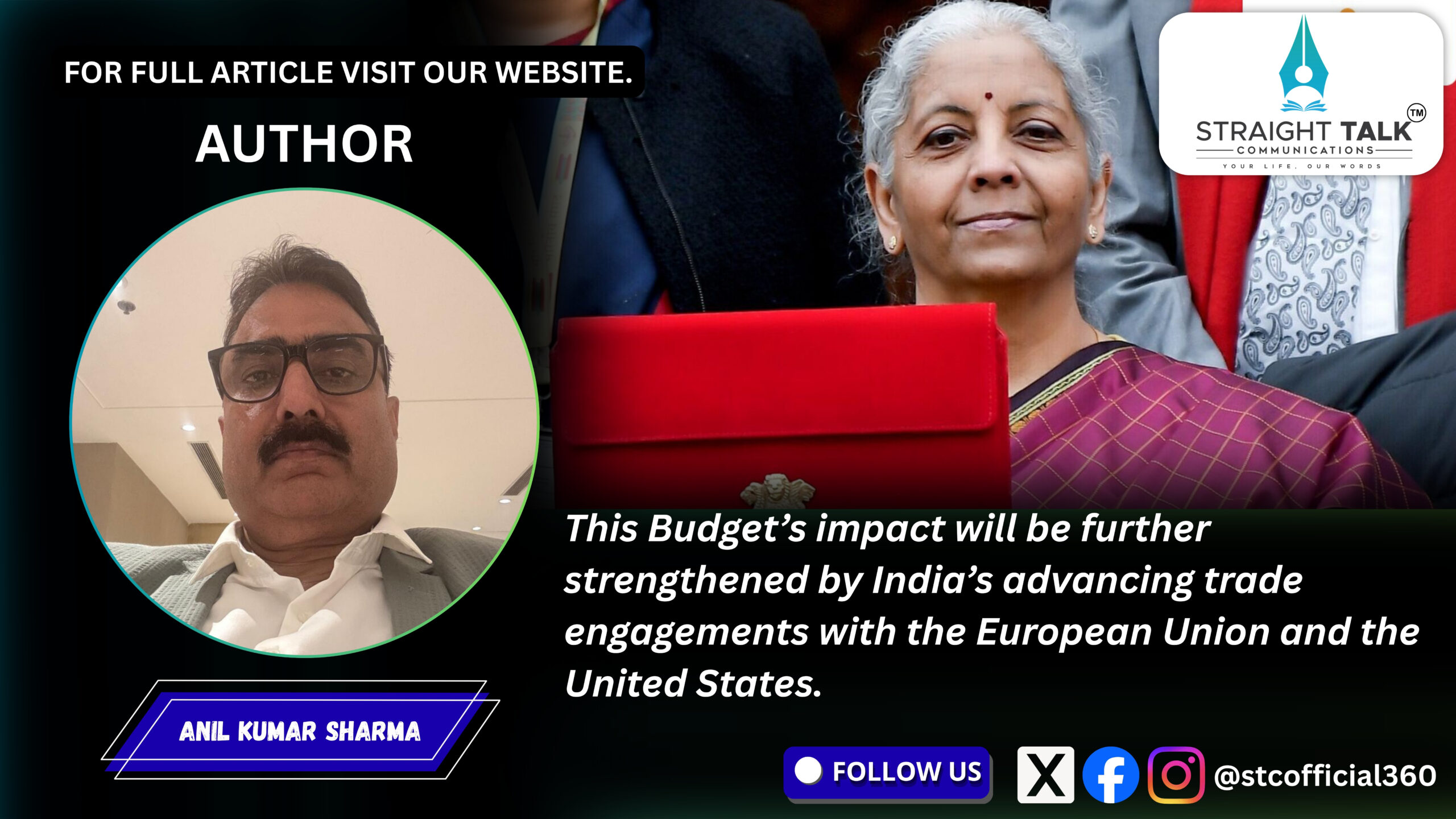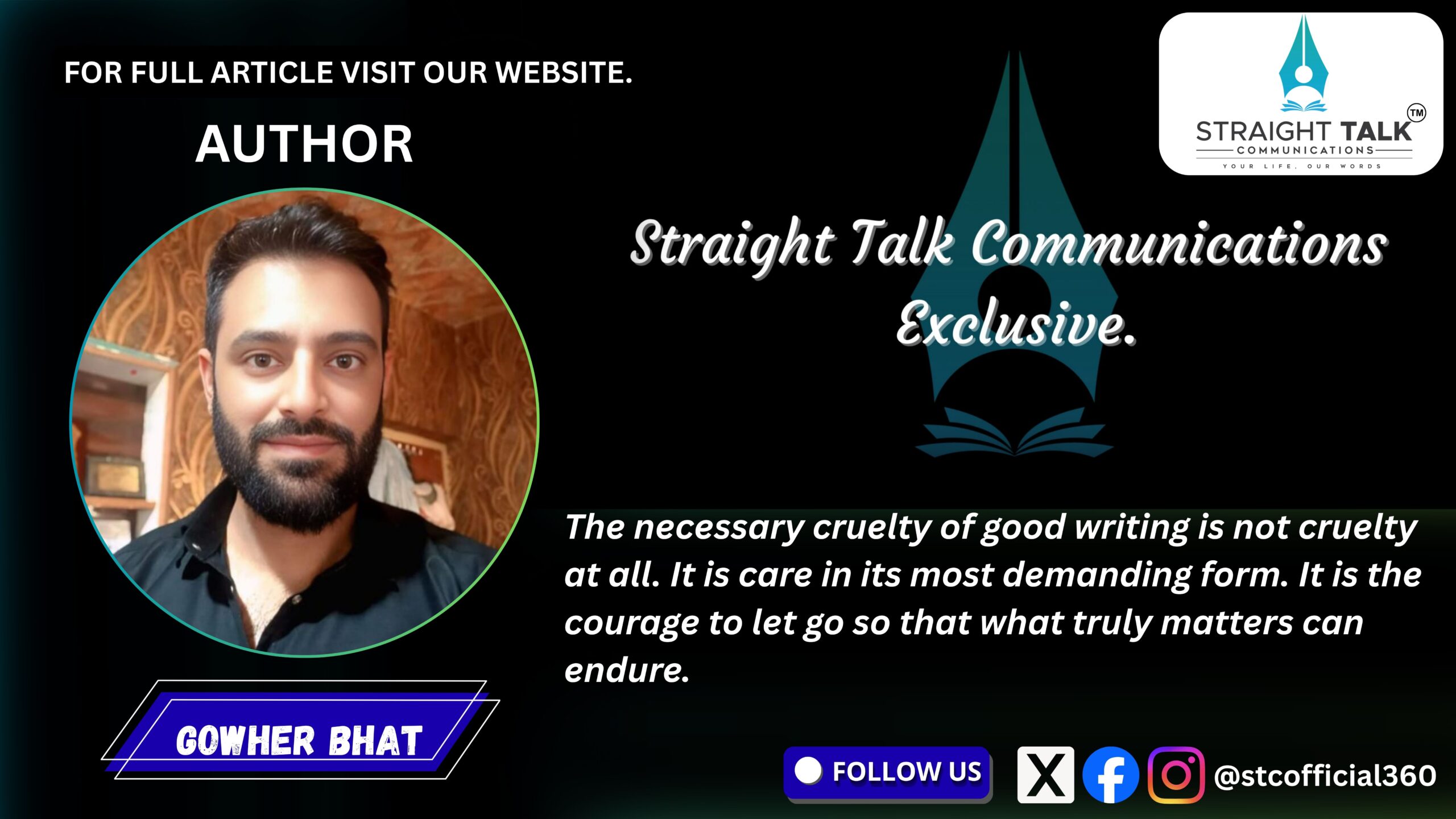Stories as Solace: The Connection Between Writing and Mental Health

Gowher Bhat
These days, life moves fast. Too fast. People are overwhelmed—racing between responsibilities, deadlines, expectations, and quiet burdens they carry inside. The world is louder than ever, but inside, many are silent. Tired. Anxious. Worn out.
Mental health, once a taboo, is now part of the public conversation. We see campaigns, awareness weeks, hashtags, therapy memes. But even now, with all that talk, many still don’t know where to turn when life gets heavy. When the heart feels hollow. When the mind won’t rest.
Some try to speak. Others go silent. Some take pills. Others fold their hands in prayer. Each path is valid. Each one is human. But there’s another way too—a quiet, powerful one. A way that requires no prescription, no appointment. Just a pen, a page. Or a book.
Write a story. Or read one. That’s all. It helps more than you’d think.
Writing It Out
There’s something healing about writing—honest, raw writing. Not perfect sentences or polished paragraphs. Just words that come from a place of truth. Thoughts turned into ink. Pain laid bare. No one’s watching. No one’s grading. It’s just you and the page. And that’s enough.
Psychologists call this expressive writing. It’s been studied deeply. James Pennebaker at the University of Texas did groundbreaking research on this. He found that people who wrote about their emotional experiences—who really poured their thoughts and feelings onto paper—showed notable improvement in both mental and physical health over time. Less stress. Lower anxiety. Even stronger immune responses.
Why does it work? Because writing brings order. Life can feel chaotic, like a storm you can’t name. Thoughts spin in circles. Writing slows them down. You start to untangle the knots. You begin to understand yourself. You begin to breathe.
In a world where people rush to be heard, writing gives you space to listen—to yourself.
Finding Yourself in Stories
But it’s not just writing. Reading can heal too.
When you read a good story, something shifts. You’re no longer just reading about a character—you start seeing your own reflection in them. You read about a man who loses someone dear. A woman who can’t sleep. A child trying to belong in a world that doesn’t understand them. And suddenly, the page feels personal. Like it’s talking to you.
Dr. Elaine Showalter once said that stories give shape to what we cannot say aloud. She’s right. Sometimes, we don’t even know what we’re feeling until we see it written in someone else’s words. That’s the power of narrative. That’s the quiet miracle of fiction and memoir and poetry.
In many communities where unemployment is high and poverty creates invisible walls around people, stories offer a kind of escape—and a kind of anchoring. Mental health remains tangled in shame and misunderstanding. But a novel, a short story, a poem—these become safe spaces. Spaces where feelings are named, grief is honored, and hope is allowed to breathe.
Stories don’t fix everything. But they open a door. And sometimes, that door is all we need.
Less Alone
Loneliness isn’t always loud. It creeps in quietly. Even in a crowded room. Even when surrounded by family. It’s the feeling of being unseen, unheard, untouched by understanding.
But when you read a good story, that feeling lifts—even if just a little. You think, “Someone else has felt this too.” You feel less strange. Less isolated. Less alone.
And there’s science behind it too. A 2013 study published in Science found that people who read literary fiction became better at empathy. They were more attuned to others’ emotions, better at reading facial expressions and emotional cues. Fiction, in other words, trains the heart as much as the mind. It helps us connect. And connection is healing.
Writing offers this too. When people share their personal stories—through blogs, poems, social media posts—they often find community. Others who say, “Me too.” That simple act of being seen and heard—that’s powerful. That’s medicine.
Stories Go Online
The internet changed everything. Once, telling your story meant convincing a publisher, submitting to magazines, waiting for approval. Now? All you need is a phone. A blog. An app.
Platforms like Wattpad, Medium, Substack, and even Instagram have become stages for storytelling. People share poems, essays, audio snippets, narrated reels. Digital literary content in India alone grew by 15% in just two years, according to FICCI. That’s huge. And behind those numbers are real people—writing, reading, healing.
Even in towns where opportunities are scarce and jobs hard to come by, this quiet revolution is underway. Young writers are emerging. They’re sharing pain, memory, love, loss. They’re capturing the complex, beautiful, aching soul of their places. They’re telling truths in their own words.
And that, in itself, is therapy. For the writer. For the reader. For the community.
Homegrown Healing
Our communities have always been rich in stories. From family legends to folklore, from lullabies to everyday tales—narratives passed down with love and lived experience. Those stories weren’t just entertainment. They were connection. Wisdom. Memory.
Now the younger generation writes their own stories. Different shape, same soul.
Writers like Ali Mohammad Lone captured everyday struggles—grief, hope, longing, faith—all woven into the human experience. Through his words, we saw ourselves. And in seeing, we healed a little.
Stories here hold more than plot. They carry generations. They carry silence. They carry unspoken prayers. That makes them sacred. That makes them medicinal.
What the Experts Say
Mental health professionals have echoed what writers and readers have known for ages: stories help.
Dr. Renu Sharma, a psychologist based in Delhi, puts it plainly: “Writing slows people down. That’s where healing starts.” In a world that rushes us to move on, get over it, smile for the camera—writing asks us to pause. To feel. To be human.
Dr. Arun Narayan says stories help us name our emotions. And that’s crucial. Because what you can name, you can face. What you can describe, you can manage. Writing and reading give us that vocabulary. That courage.
Final Lines
We live in a noisy, restless world. Too many notifications. Too many expectations. But stories offer something rare—stillness. They ask us to slow down. To pay attention. To listen—not just to others, but to ourselves.
Writing doesn’t promise to fix everything. Reading won’t erase grief. But both offer a path. A lamp in the dark. A voice in the silence. A mirror to the soul.
As Nissim Ezekiel once wrote, “The truth is not always beautiful, but the hunger for it is.”
Stories feed that hunger. And sometimes, that’s all we need.
(The author is a published writer, freelance journalist, creative storyteller, and English instructor based in Kashmir.)








Access ChatGPT, Claude, Gemini Pro , Kling AI, LLaMA, Mistral, DALL.E, LLaMa & more—all from a single dashboard.
No subscriptions or no monthly fees—pay once and enjoy lifetime access.
Automatically switch between AI models based on task requirements.
And much more … hamsterkombat.expert/AIIntelliKit